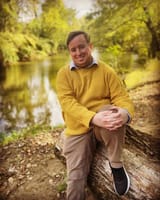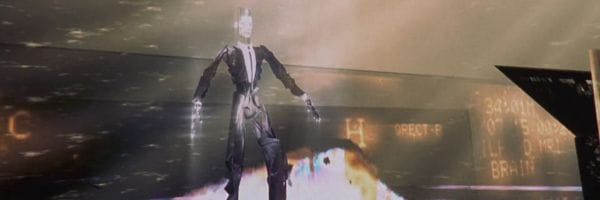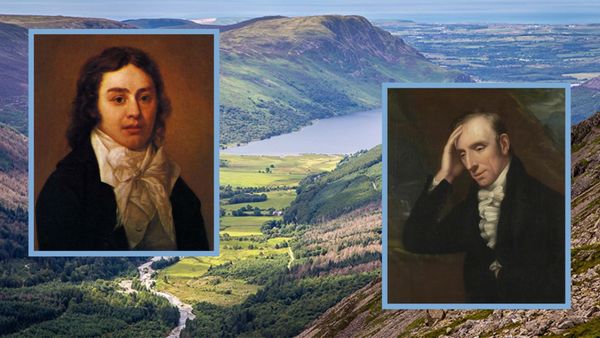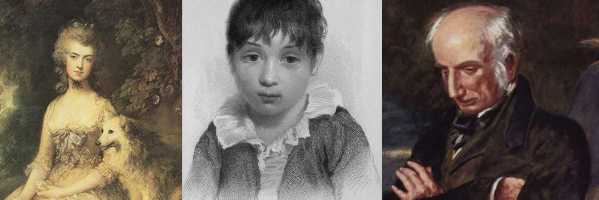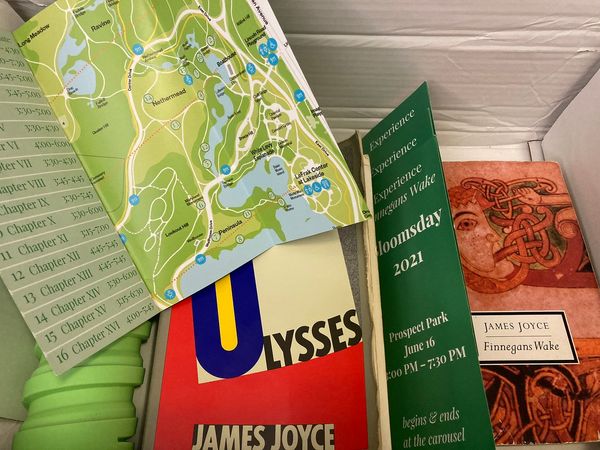Every Moment Is a Window on All Time
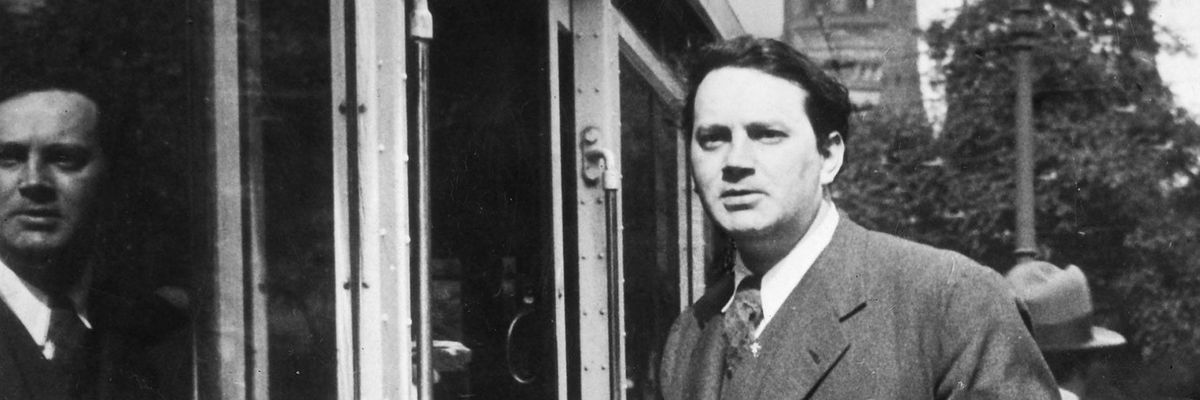
It was no madness, for the bodily eye
Amid my strongest workings evermore
Was searching out the lines of difference
As they lie hid in all external forms,
Near or remote, minute or vast, an eye
Which from a tree, a stone, a withered leaf,
To the broad ocean and the azure heavens
Spangled with kindred multitudes of stars,
Could find no surface where its power might sleep
These lines from Book III of William Wordsworth's autobiographic epic poem The Prelude are—as first noticed by Monroe M. Stearns in "The Metaphysics of Thomas Wolfe"—later recalled by Wolfe in the opening proem of his first novel, Look Homeward, Angel. Wolfe begins, "...a stone, a leaf, an unfound door; of a stone, a leaf, a door. And of all the forgotten faces," and then ends this opening passage,
Remembering speechlessly we seek the great forgotten language, the lost lane-end into heaven, a stone, a leaf, an unfound door. Where? When?
O lost, and by the wind grieved, ghost, come back again.
Wolfe's concern is the inevitable loss of a certain perception, which passes away from us without ever having solidified into memorable language. More than just nostalgia, this is what I wrote about in my last newsletter from Wordsworth's recollections of early childhood, where he asks,
Whither is fled the visionary gleam?
Where is it now, the glory and the dream?
It is not necessarily that life was better in that early stage—and this is something that Wolfe particularly emphasizes—but that there is a lingering presence for which their adult minds cannot fully account.
To Wordsworth's "a tree, a stone, a withered leaf," Wolfe adds "an unfound door." I understand this not in the same of a "road not taken," but more liminal: One first had to have had a sense of there being some door just out of sight. What is lost and forgotten is from early childhood, which for both writers had a "visionary gleam." Wolfe's novel follows his semi-autobiographical character's life from his family's arrival in the United States in 1837 and his birth in 1900 to him leaving home 19 years later. Narrating a moment of early childhood, Wolfe writes:
Eugene watched the sun wane and redden on a rocky river, and on the painted rocks of Tennessee gorges: the enchanted river wound into his child's mind forever. Years later, it was to be remembered in dreams tenanted with elvish and mysterious beauty.
In the following paragraph, he writes, "He realized vaguely that it was far from the great central web and roar of the city—he thought he heard some one say four or five miles. Where was the river?" The passage is full of fond recollections mixed with questioning and wonder. Wolfe is capturing the limits of his childish perspective, which did not know how far the city was and, practically speaking, did not need to know—but he knew that there was more of and more to the world around him. The river wound into his mind—but to where? Some unfound door, some forgotten language, some "lost lane-end into heaven" escaped him then, and escapes him now.
Moving even earlier in the novel, we see Wolfe's attempt to capture a more infant perception. Here we see his sense that these were not strictly happier times: "with the thick sunlight printed in bars upon the floor, unfathomable loneliness and sadness crept through him." Captured in this moment is a sense of wider human experience. This is not just a maximalist project of capturing the full scope of a life, but his infancy reveals something lasting about humanity:
He saw that the great figures that came and went about him, the huge leering heads that bent hideously into his crib, the great voices that rolled incoherently above him, had for one another not much greater understanding than they had for him: that even their speech, their entire fluidity and ease of movement were but meagre communicants of their thought or feeling, and served often not to promote understanding, but to deepen or widen strife, bitterness, and prejudice.
Perhaps escaping a bit the limits of the child's awareness at times, Wolfe blends the sense of figures popping in and out and rolling voices with the idea that even the adults cannot achieve the fullness of their desired expression. The infant may see the adult movement and speaking as a yet-locked power toward which to strive, but it is then a failing to think that we have fully cleared this in escaping our youth. Describing the Romantic reaction in Science and the Modern World, Alfred North Whitehead describes the core of Wordsworth's great contribution as having "felt that something had been left out ... that was most important"—and so through his poetry, he "opposes to the scientific abstractions his full concrete experience."
Wordsworth recognized a greater world of feeling which was being underexplored, and found a productive method in plumbing the depths of his formative moments through his epic poem. Wolfe takes this same formula for his novels, looking as well to what Wordsworth calls in The Prelude "spots of time":
There are in our existence spots of time,
That with distinct pre-eminence retain
A renovating virtue, whence, depressed
By false opinion and contentious thought,
Or aught of heavier or more deadly weight,
In trivial occupations, and the round
Of ordinary intercourse, our minds
Are nourished and invisibly repaired
There are many examples of such moments in The Prelude, but the defining one Wordsworth gives here, towards the end of his epic, is a moment in early childhood in which he had travelled out on horseback with a servant, but eventually got lost. Through fear, he wanders off more, and ends up encoutering a much-gossiped-about spot in which a murderer had been hung long ago, in which spot the murderer's name had been carved, and
still, from year to year,
By superstition of the neighbourhood,
The grass is cleared away, and to this hour
The characters are fresh and visible:
A casual glance had shown them, and I fled,
Faltering and faint, and ignorant of the road
It is in the context of this deeper fear that Wordsworth then has another encounter:
Then, reascending the bare common, saw
A naked pool that lay beneath the hills,
The beacon on the summit, and, more near,
A girl, who bore a pitcher on her head,
And seemed with difficult steps to force her way
Against the blowing wind. It was, in truth,
An ordinary sight; but I should need
Colours and words that are unknown to man,
To paint the visionary dreariness
Which, while I looked all round for my lost guide,
Invested moorland waste, and naked pool,
The beacon crowning the lone eminence,
The female and her garments vexed and tossed
By the strong wind.
It is in such moments that Wordsworth discovers that his outward sense only goes so far, and that the higher power is in his mind to create and re-create scenes. A "visionary dreariness" had "invested" the sight in his mind—and he lacked the words and colors to describe what he saw and felt. He doubted whether anyone knew how—"the great forgotten language, the lost lane-end into heaven, a stone, a leaf, an unfound door"—a pressing question for a poem centrally concerned with preparing himself to write an even larger project by making fuller sense of his imaginative powers and how they were formed.
In a later section of Look Homeward, Angel, Wolfe's character, Eugene Gant, is older and in schooling, but "still prison-pent" as he had been in his crib many years prior. "But," he says,
he turned always to Margaret Leonard as toward the light: she saw the unholy fires that cast their sword-dance on his face, she saw the hunger and the pain, and she fed him—majestic crime!—on poetry.
Reading poets—Wordsworth among them—and later novelists, Wolfe begins finally to achieve something of "the great forgotten language," ultimately culminating in the novel.
Words, though, are not enough. Like Wordsworth, he needs colors unknown to man to paint the visionary dreariness, or the visionary gleam—and so he bemoans, "O lost, and by the wind grieved, ghost, come back again." Like Wordsworth as well, though, the ghost cannot truly come back, but he can only seek to find abundant recompense, and so we get the Wordsworthian method of spots of time, leading into Wolfe's opening passage:
Each moment is the fruit of forty thousand years. The minute-winning days, like flies, buzz home to death, and every moment is a window on all time.
This is a moment:
Leading into a novel which is not a found, but a newly invented door—though perhaps still serviceable: No lane-end into heaven, but at least into all time.
Sign-up below for more updates on literature past, present, and yet to come—delivered right to your inbox:

